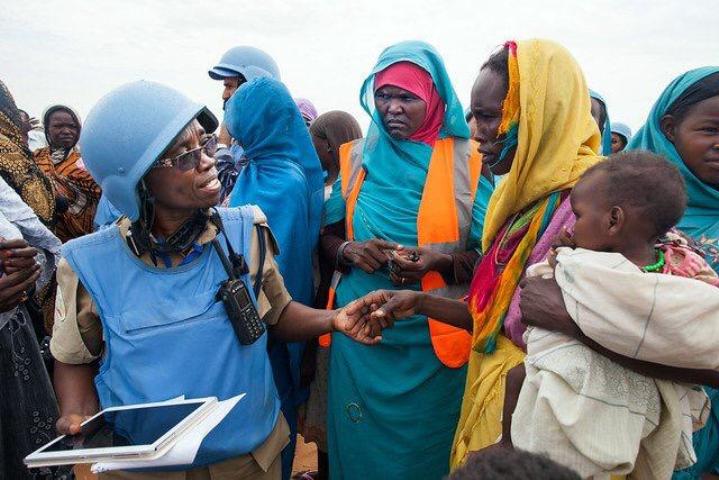UN Resolution 1325 Marks 24th Anniversary Amidst Calls for Greater Action on Women's Role in Peacebuilding
Despite 24 Years of Advocacy, Women Remain Underrepresented in Peace Processes, Urging for Decisive Action and Funding.

Last month, the United Nations commemorated the 24th anniversary of Security Council Resolution 1325 on Women, Peace, and Security (WPS), marking a milestone in the recognition of the unique needs of women in conflict zones. However, during the Security Council’s open debate, many voices raised concerns about the persistent challenges faced by women in conflict areas and the limited progress in fully implementing the WPS agenda.
The NGO Working Group on WPS issued an open letter emphasizing that the vision of peace and equality outlined by the WPS agenda is under increasing threat. NGOs are urging UN Member States to take concrete action in ten key areas, including preventing armed conflict, ensuring women’s representation in decision-making, protecting women’s human rights, and adequately funding peace initiatives.
What is Security Council Resolution 1325?
Adopted in 2000, Resolution 1325 was the first international framework to recognize the distinct needs of women affected by war and the essential role they play in conflict prevention and peacebuilding. The resolution calls for the international community to ensure women’s participation in peace processes, protect them from gender-based violence, and deliver relief that addresses their needs in conflict-affected regions. It also emphasizes the importance of the rule of law and prevention efforts to reduce violence against women.
Lack of Progress in Implementing Resolution 1325
Despite numerous resolutions and consistent advocacy, women remain underrepresented in peace negotiations and receive inadequate support in grassroots peacebuilding efforts. Data over the past decade reveals troubling stagnation. In 2023, women made up only 9.6% of peace negotiators globally, with minimal progress in advancing gender equality in formal peace processes.
Additionally, funding for local women’s organizations, crucial for peacebuilding at the community level, remains insufficient. In 2021-2022, only 0.3% of Official Development Assistance was allocated to these organizations, far below the recommended 1% target.
Call for Action: Women Shaping Peace
To mark the anniversary of Resolution 1325, UNDP hosted a special event, Women Shaping Peace: A Call for Action to Amplify Meaningful Participation in Crisis and Politically Complex Settings, bringing together women leaders from various fields to discuss their experiences in conflict-affected regions.
Shoko Noda, Assistant Secretary-General and Director of the UNDP Crisis Bureau, emphasized the necessity of elevating women’s leadership, stating, “Elevating women’s leadership, experiences, and expertise is not only the right thing to do—it is necessary to build strong foundations for resilience and inclusive development.”
Notable speakers included Dr. Nada Aljubouri, former Iraqi Parliament member, who stressed the importance of enforcing the 25% quota system for women’s representation in decision-making, and Stephanie Elijah, a key figure in the peace process in Bougainville, who advocated for the inclusion of women in policymaking to sustain peace.
Women’s Leadership in Ukraine, Bougainville, and Yemen
Women continue to play a crucial role in conflict resolution and recovery efforts in various regions. In Bougainville, women have been instrumental in ending armed conflict, with leaders like Stephanie Elijah ensuring that women’s voices are central in policy development.
In Ukraine, Olha Melnyk of the Center for Gender Education highlighted the role of women in early recovery, specifically in securing international support to rebuild war-torn infrastructure, demonstrating how women-led civil society can catalyze major change even amid adversity.
Weam Saif from Yemen’s Youth Horizon Foundation emphasized the importance of collaborative partnerships between women and local governments, stating that these collaborations help shape policies that address the needs of the community.
UNDP’s Commitment and the Need for More Funding
Raquel Lagunas, UNDP’s Director of Gender Equality, reiterated the organization’s commitment to working alongside women leaders, stressing that women’s full participation in decision-making must be ensured during and after armed conflict. The international community, she emphasized, must provide adequate financial support to sustain these peacebuilding efforts and close the gaps in funding and participation.
The 24th anniversary of Resolution 1325 underscores the ongoing need for decisive action to ensure that women’s contributions to peacebuilding are recognized and supported. The call for increased funding and meaningful representation in decision-making spaces remains as urgent as ever.










